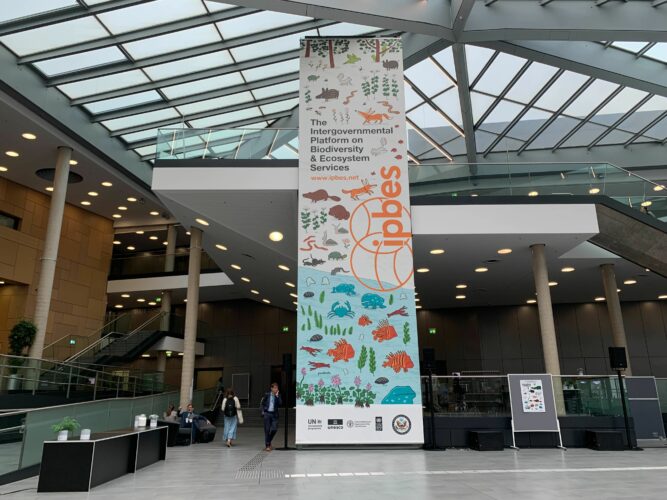Future Earth at IPBES 10: Assessing Invasive Alien Species
Final Update
IPBES 10 has come to an end, and a long-awaited assessment on Invasive Alien Species (IAS) and their control has finally been published. Alongside the approval of the final document, delegates have extensively discussed matters related to building capacity, strengthening knowledge foundations, and supporting policy, and the engagement of the platform with the IPCC.
Notably, delegates have elected David Obura as the next IPBES Chair. David is an Earth Commissioner and on the Scientific Steering Committee for bioDISCOVERY, a Future Earth Global Research Network. Namibia’s offer to host IPBES 11 in December 2024 was also accepted.
Here’s a recap of the main developments and decisions taken at the Plenary:
Invasive Alien Species Assessment – Summary for Policy Makers (SPM)
-
In its final decision, the Plenary approved the Summary for Policy Makers (SPM) of the thematic assessment of IAS and their control, and accepted the chapters of the assessment, as well as their executive summaries.
What are the main messages of SPM?
- AIS are among the least studied of the five main causes of biodiversity collapse (others are: Land-use change, over-exploitation, pollution, climate disruption)
- IAS are a major threat to nature, Nature’s Contributions to People (NCP), and good quality of life, causing dramatic and, in some cases, irreversible changes to biodiversity and ecosystems.
- The threats from IAS are increasing markedly in all regions of Earth, with the current unparalleled high rate of introductions predicted to rise even higher in the future.
- Although many human activities facilitate the transport, introduction, establishment, and spread of IAS, there are management options to reduce the number and impact of IAS.
- Such management options include initiatives on prevention and preparedness, eradication, containment and control, and adaptive management.
- Through a complementary set of strategic actions – including closer collaboration and coordination across countries and sectors, capacity building and increasing public awareness – integrated governance can limit the global problem of IAS throughout the biological invasion process and at local, national, and regional scales.
- The most cost-effective actions that can be taken are prevention and early detection, which is why it is significant that a big institution like IPBES recognizes this issue and brings attention to it through this assessment
It’s important to note the distinction between alien species and alien invasive species. Not all alien species are ‘bad’ and some are actually beneficial. Only 3,500 alien species are identified as ‘invasive’ but they still have a big impact (on biodiversity, human health, economy, etc.). Read more.
Engagement with the IPCC
-
The Plenary has invited all the IPBES national focal points to continue to engage and collaborate with their IPCC counterparts. It has also called on the Bureau and the Secretariat to continue to explore with the IPCC concrete approaches for cooperation and joint activities.
-
The Plenary has issued a call for new suggestions for thematic or methodological issues related to biodiversity and climate change, which could be potentially object of a collaboration with the IPCC. Read more.
Building capacity, strengthening knowledge foundations, and supporting policy
The Plenary has approved five work plans for the intersessional period 2023-2024 and the institutional arrangements to support them. The main decisions taken refer to the following work program objectives:
-
Building capacity
-
Developing training and familiarization programs for IPBES experts and stakeholders, including youth and other experts involved in the science-policy interface.
-
Facilitating the sharing of knowledge and best practices among existing science-policy platforms and among the actors interested in establishing new ones.
-
-
Strengthening knowledge foundations:
-
Providing support to assessment authors on aspects relating to data and knowledge management policy and on identifying knowledge gaps.
-
-
-
Reviewing and further developing the process for catalyzing the generation of new knowledge and identifying knowledge gaps, including the development of a proposal in collaboration with the task forces for scenarios and models, and for indigenous and local knowledge (ILK).
-
Providing support for the assessment of capacity building and training of ILK liaison groups for future incoming assessments, and organizing dialogue workshops with members of IPLCs and experts on ILK.
-
-
Supporting policy
-
-
Facilitating an intersessional dialogue on the future role of the policy support function and its related objectives to be considered at IPBES 11.
-
Increasing the policy relevance of IPBES assessments and its use in decision-making.
-
Mobilizing experts in scenarios and models to contribute to upcoming assessments while providing advice and input to IPBES assessment author groups on scenarios and models.
-
Finally, with a look to the future, the Plenary has approved additional assessments to be prepared up to 2030: a fast-track methodological assessment on monitoring biodiversity and nature’s contributions to people and a fast-track methodological assessment of biodiversity-inclusive spatial planning and ecological connectivity.

IPBES 10 Plenary day 1 and 2 have wrapped up!
Countries have started a week of negotiations that will conclude this Saturday, 2 September to discuss the adoption of the assessment on invasive alien species as well as to deliberate on IPBES rolling work program up to 2030.
The first day of the plenary opened with a speech by Kyle Whyte, US Science Envoy for Indigenous and Local Knowledge, who reflected on how IPBES has the potential to go beyond inclusivity of knowledge toward the mainstreaming of leaderships and responsibility of indigenous people within the platform. In an exercise, he asked the audience to imagine a situation where it would be scientists – and not indigenous peoples – to struggle for recognition and access to decision making.
The importance of the adoption of the Global Biodiversity Framework in December 2022 was underscored by many speakers and countries, noting how IPBES has informed its adoption and should keep informing its implementation and monitoring framework. In this regard, many members have called for the creation of a second global assessment of biodiversity and ecosystem services that would contribute to support national biodiversity reporting.
Delegates had a chance to hear about the progress on all of IPBES objectives. Among other developments, three reports are in progress:
- The nexus assessment: Looking at the interlinkages among biodiversity, water, food and health within the context of climate change
- The transformative change assessment: Assessing the underlying causes of biodiversity loss and drivers of transformative change
- The business and biodiversity assessment: Reviewing the dependence of business on biodiversity and nature’s contributions to people.
Future Earth holds observer status with IPBES, enabling us to nominate experts from our community to participate in meetings, workshops, assessments like IPBES 10, and more. These opportunities allow our community to highlight their research at an international cale, helping to shape and reframe policy around relevant biodiversity issues. Learn more.
Future Earth is proud to have several experts both nominated by and affiliated with our community who are contributing to the IPBES Nexus and Transformative Change Assessments:
Transformative Change experts:
- Erle Eellis – Lead Author, University of Maryland, Baltimore County (nominated by Future Earth)
- Lucas Garibaldi – Chair, Universidad Nacional de Río Negro; EvolvES Global Research Network
- Lynn Shannon – Coordinating lead author, Department of Biological Sciences, University of Cape Town; bioDISCOVERY Co-Chair
- Sebastian Villasante – Coordinating lead author, University of Santiago de Compostela; involved in various Future Earth activities
- Chinwe Ifejika Speranza – Lead author, University of Bern; PECS Global Research Network
- Markus Fischer – MEP task force/expert group member, University of Bern; Chair, Scientific Steering Committee, Global Mountain Biodiversity Assessment Global Research Network
Nexus experts:
- Lucas Enrico – Lead author, National Scientific and Technical Research Council of Argentina (CONICET) (Nominated by Future Earth)
- Diana Mangalagiu – Coordinating lead author, University of Oxford (nominated by Future Earth)
- Giles Sioen – Review editor, National Institute for Environmental Studies, Japan/Future Earth (nominated by Future Earth)
- Chadia Wannous – Lead author, World Organization for Animal Health (nominated by Future Earth)
- Pamela Mcelwee – Chair, UK Centre for Ecology and Hydrology; Earth Leadership Fellow
- David Obura – Chair, Coastal Oceans Research and Development – Indian Ocean (CORDIO) East Africa; involved in various Future Earth networks including the Earth Commission
- Mark Rounsevell – Coordinating lead author, Karlsruhe Institute of Technology; Co-Chair, Scientific Steering Committee, AIMES Global Research Network; Global Land Programme
- Fabrice Declerk – Coordinating lead author, Bioversity International/CGIAR; involved in various Future Earth networks and activities, including the Earth Commission
- Kim Schumacher – Lead author, Kyushu University/University of Oxford; Earth System Governance Global Research Network


IPBES 10 Plenary has officially kicked off!
Scientists, government leaders, policymakers, members of Indigenous Peoples and local communities are in Bonn, Germany this week for the tenth session of the Plenary of the Intergovernmental Science-Policy Platform on Biodiversity and Ecosystem Services (IPBES 10). The focus is on invasive alien species (animals, plants, fungi and microorganisms that live in environments outside their natural habitats), which are a direct driver of biodiversity loss. The massive threat they pose is not well quantified, nor is it well understood by decision makers. Experts will spend the week assessing current trends, impacts, and management options surrounding invasive alien species, and the Plenary will be invited to accept the report and approve its summary for policymakers.
Stakeholder day
Future Earth has a delegation in attendance at IPBES 10. Ahead of the Plenary, the Future Earth delegation attended the Stakeholder Day on Sunday – organized for all observer organizations to come together and coordinate and discuss their involvement with IPBES work.
Here is a recap of the points of discussion:
- The International Indigenous Forum on Biodiversity and Ecosystem Services (IIFBES) has highlighted how addressing the biodiversity crisis requires working across values, and how the work on integrating different value systems in research and policy is just at the beginning.
- Discussions have also turned towards the uptake and impact of IPBES work, especially by businesses and financial institutions. Quality access to finance has also been highlighted as necessary to move beyond conservation alone and towards the prioritization of nature across all development sectors.
- Data is crucial to IPBES work, and the Task Force of data and knowledge has underlined how the principles of fairness and care are the basis to handle data at IPBES. The Task Force has also called on the importance of open science and the need to implement it in scientific work from its beginning.
Keep watching this post for updates from our delegation on the happenings at IPBES 10.
DATE
August 28, 2023AUTHOR
Bridget BlakeStephanie O'Toole
Viola Baldeschi
SHARE WITH YOUR NETWORK
RELATED POSTS
Future Earth Taipei Hosts the 2024 Ocean Action Symposium
Program Now Available for the Year’s Top Sustainability Science and Innovation Event in Finland
Apply for the 2024 Pathways Autumn School: Transformative Research for a Just World and a Habitable Planet